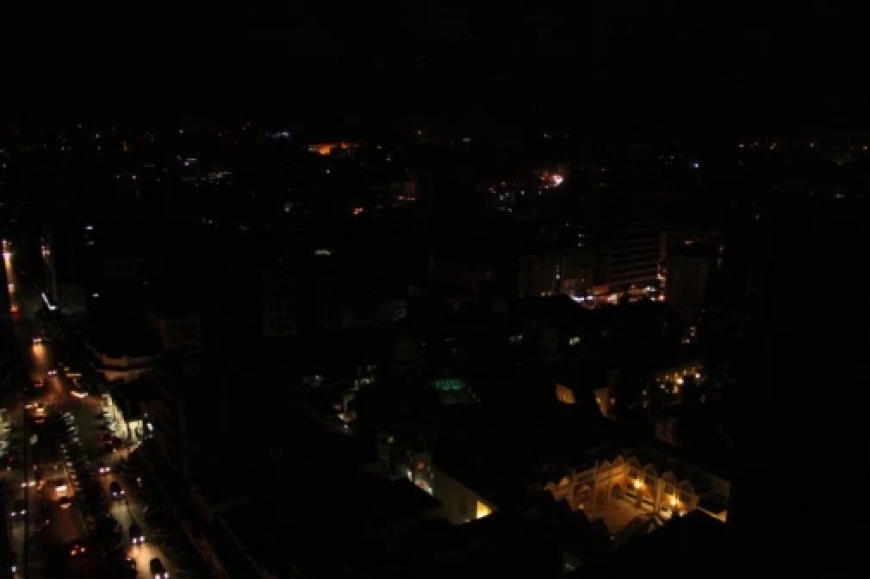Power Blackouts Silencing Kenya's Remote Work, And No One Seems To Care
I'm typing this in the middle of a five-day blackout that's crippled operations at my digital platform. Yes, I run it alone.

We claim that Kenya is a Silicon Savannah, or at least trying to be, but we cannot keep our power on consistently.
I'm typing this in the middle of a five-day blackout that's crippled operations at my digital platform. Yes, I run it alone.
During that period, I've had to leave my house more often than necessary just to charge my phone and my laptop, as well as find a WiFi spot that's been mainly coffee restaurants, because the majority of co-working spaces are priced beyond my reach (I've never seen one that's affordable to the ordinary Kenyan).
Using money that I've not budgeted for, and struggling to catch up to the day's developments. I've hit my lowest point in five years, all because of Kenya Power.
Five days of sitting in darkness non-stop, consigned to the fact that I probably lost clients, potential paid partnerships and the ability plus morale to keep up to date with the stories of this long weekend, Madaraka Day included. What is worse is that my rivals and critics have probably thought they've won.

Photo of a laptop and a phone at an office. /BUSINESS RADAR
Anywho, working from home has gained prominence since the COVID-19 period, but Kenya Power makes it as if we are still living like we're in 2010!
In recent years, Kenya has witnessed a surge in remote work, driven by technological advancement, rising internet penetration, and a global shift toward flexible work models. From Nairobi to Nakuru, professionals have slowly embraced the home office as a viable alternative to the traditional 9-to-5 workplace.
Freelancers, online journalists and editors, digital marketers, developers, and virtual assistants are reshaping the workforce, proving that productivity doesn’t have to be tethered to physical office spaces. But this transformation is under threat — not from a lack of talent or ambition, but from something as basic as electricity.
Kenya’s unreliable power supply has emerged as a silent yet crippling enemy of remote work. Frequent blackouts, often lasting hours, days, weeks, even months, are killing productivity, morale, and the dream of a digitally empowered workforce.
Despite the push for digital transformation and innovation hubs, millions of Kenyans working from home face the daily uncertainty of when — or if — they’ll have power.
It is not uncommon for neighbourhoods to go dark multiple times a week, without prior notice. For many, these outages happen during peak working hours, cutting off access to the internet, disrupting meetings, and rendering laptops and mobile devices useless once the battery dies.
The most affected are independent workers — freelancers, online business owners, and journalists — who don’t have the luxury of office generators or institutional support. They operate from their homes or modest setups where the only power backup might be a power bank or candlelight. Each blackout doesn't just pause work; it unravels plans, deadlines, and income.
One of the greatest casualties of these frequent power outages is productivity. Deadlines slip. Clients grow impatient. Stories go unwritten. Emails go unsent. Momentum is lost. In remote work, where time is directly tied to income and reputation, every hour without electricity is a tangible loss.
But the cost is not just professional — it is psychological. Imagine working on a story or project only for your laptop to shut down mid-sentence because there's no power and your backup battery has died.
Imagine missing a job interview because your router went off five minutes before the call.
The frustration builds. The helplessness eats away at your morale.
For many remote workers, burnout no longer stems from overworking but from trying to work and failing because of infrastructure failure. The mental toll of knowing that your future and success are vulnerable to the whims of an unreliable power grid is exhausting.
Government narratives often celebrate Kenya as a tech-savvy nation — the Silicon Savannah. Mobile money innovation, tech hubs and the spread of fibre-optic connectivity are all rightly praised. But this optimism often ignores a foundational flaw: electricity is still a luxury for many. The irony is glaring.
You can have the best laptop, the fastest internet plan, and a strong work ethic, but none of it matters when your socket has no power.
In a digital economy, power is oxygen. Without it, the talk of online entrepreneurship, remote opportunities, and a vibrant creator economy becomes performative, at least for those outside privileged urban bubbles with backup power and inverters.
Power blackouts don’t affect everyone equally. While large companies and wealthier individuals can afford generators, inverters, and solar systems, most Kenyans cannot. This turns access to consistent electricity into a class issue.
Young people in informal settlements, rural towns, or middle-class estates are often locked out of digital opportunities not because they lack skill or ambition, but because they simply can’t stay online long enough to participate. The dream of remote work becomes a privilege rather than an equaliser.
Women, who are more likely to work from home due to caregiving responsibilities, are disproportionately affected. For a single mother trying to freelance or build an online brand from home, a day without power can mean losing clients, gigs, or even the motivation to continue.
Online forums and social media are full of stories that rarely make it to mainstream headlines. A video editor in Kisumu who lost a client because he couldn’t deliver a project on time. A content creator in Meru who missed a scheduled YouTube premiere. I, a digital journalist in Nairobi who had to kill a breaking news story because the power went out and mobile data was too weak to upload it on time.
These are not rare exceptions — they are daily realities for thousands of Kenyan professionals whose careers now depend on steady electricity.
If Kenya truly wants to embrace the future of work, the government, Kenya Power and the private sector must prioritise power stability as a core part of the remote work infrastructure. This isn’t just about lighting homes — it’s about enabling economic participation.
Here are a few recommendations to the monopoly power firm (because there's no one out there to challenge them):
- Upgrade the national grid with investments aimed at reducing unplanned outages, especially in high-density residential areas.
- Expand access to affordable solar solutions, especially for low-income earners and remote workers.
- Create incentives for co-working spaces to serve as power-secure hubs for remote workers in underserved towns, sub-counties, counties and cities.
- Increase transparency and communication from Kenya Power, including timely updates on blackouts and estimated restoration times, if they even care to listen.
- Support local manufacturing and distribution of small, affordable inverters and battery packs suited for single-person use.
Kenya has the talent, tools, and ambition to thrive in a remote-first world. But without stable electricity, we are sabotaging our potential.

Power blackout in Kenya. /STANDARD DIGITAL
Every blackout isn’t just a flicker in the grid — it’s a dimming of someone’s dream, someone’s deadline, someone’s dignity.
The future of work is digital, but it cannot run on hope alone. It needs power. And until Kenya solves the blackout crisis, working from home will remain an uphill battle for those who dare to build outside the traditional systems.
Marvin Chege is the founder and editor-in-chief of Viral Tea. He is a self-taught digital journalist and a young digital media expert with over 5 years of experience creating content that mainly concerns the youth: zillennials and Gen Z.






